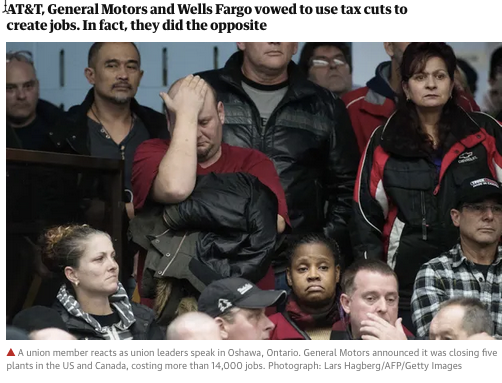Stephen Smith worked at an AT&T call center in Meriden, Connecticut, for over 20 years before the giant telecoms company announced it was closing the city’s three call centers in February 2019.
“At 46 years old, I’m looking for a new job,” Smith said. “They basically told us we either need to move south or lose our job. It was out of the blue. We had no idea.”
Smith and about 90 of his colleagues were offered severance packages or the option to relocate to Georgia or Tennessee. But for most workers who have spouses with their own careers, elderly parents nearby in need of care, or children still in school, relocating on a whim isn’t an option.
These sudden mass layoffs have become increasingly common for workers at AT&T and many other big firms. But it was not meant to be that way.
T&T’s CEO, Randall Stephenson, promised in November 2017 to invest $1bn in capital expenditure and create 7,000 new jobs at the company if Trump’s hugely controversial tax cut bill passed. Many opponents had slammed the cuts as a corporate giveaway that benefited the super-rich. But big firms lobbied for it, saying – as AT&T did – that it would fund job-creating expansions.
The bill was voted into law in December 2017, reducing the corporate tax rate from 35% to 21%. AT&T’s benefit was a tax windfall of $21bn and an additional estimated $3bn annually. But instead of creating jobs and increasing investment into the company, AT&T has eliminated 23,328 jobs since the tax cut bill was passed, according to a recent report by the Communications Workers of America. The CWA also said AT&T reduced their capital investments by $1.4bn.




